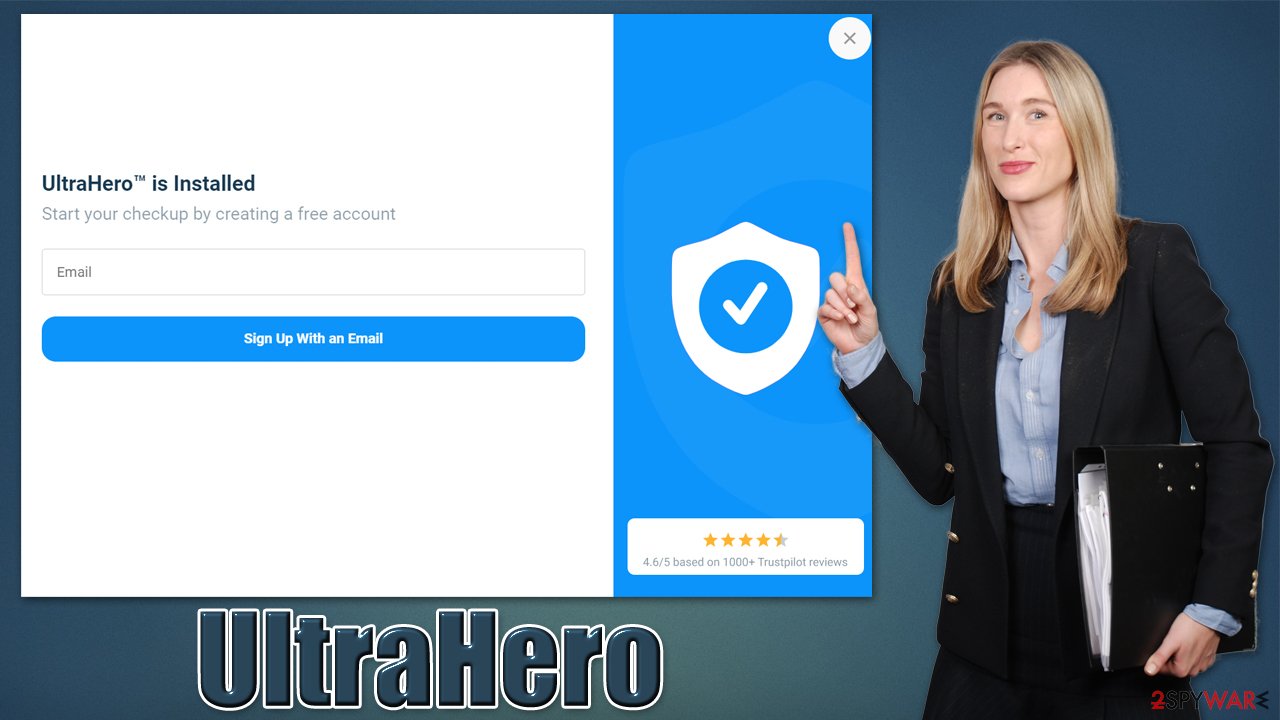UltraHero adware (Free Instructions)
UltraHero adware Removal Guide
What is UltraHero adware?
UltraHero adware is a deceptive application that claims to block ads and protect privacy

UltraHero is a potentially unwanted browser extension that attempts to promote itself as a reliable tool for browsing the web. According to the main page of the app, it can increase the speed of the browser, clean it, protect private information and help browse securely online. Unfortunately, this couldn't be further from the truth.
In reality, UltraHero is an adware application whose main goal is to ensure users are exposed to as many advertisements as possible. As a result, those who install it immediately notice pop-ups, deals, offers, banners, and other commercial content constantly appearing while browsing the web.
Adware might not only be annoying to deal with due to advertisements but also encourage users to visit potentially dangerous websites, where they could be tricked into subscribing to push notifications, losing money on useless services, installing malware, or providing their personal information to unknown parties.
| Name | UltraHero |
| Type | Adware, potentially unwanted browser extension |
| Distribution | Software bundles, misleading ads, third-party websites |
| Symptoms | Shows intrusive advertisements on various websites |
| Risks | Installation of potentially unwanted software, such as browser hijackers; redirects can also lead to other malicious websites, resulting in monetary loss or personal data disclosure to unknown parties |
| Removal | You should uninstall the unwanted extension as explained in our guide and then check your system with SpyHunter 5Combo Cleaner security software |
| Other steps | To ensure that adware is no longer tracking your data, you should clean your browsers with the FortectIntego repair tool |
PUP distribution
Adware is notorious for its suspicious operation and distribution. For example, many people discover a potentially unwanted application running on their systems unexpectedly, without seemingly installing it in the first place. However, it is not the case, as adware rarely spreads using automatic methods such as software vulnerabilities[1] or spam emails. Instead, misleading phishing messages and software bundles are commonly used.
These infiltration methods are relatively common and result in thousands of users getting infected each day. To avoid this unfortunate scenario, you should always pay close attention to the installation process of freeware[2] you download from third-party websites. For example, choosing Recommended/Quick settings or missing the pre-ticked checkboxes often results in infiltration of potentially unwanted or malicious software.
Asks to provide personal information
In some cases, users may also install the application after believing its promises. On its official website, it is claimed that the extension can do many things at once, although there's nothing really concrete mentioned:
UltraHero helps you browse quickly and securely. It will clean your browser, speed it up, and protect your private information.
There is no explanation of how the app is doing all these things. The truth is, UltraHero adware was never designed to improve the user browsing experience, as its main goal is to spam people with ad campaigns that are meant to generate a commission each time an advertisement is seen or clicked on. Some of these apps can be of dubious nature, and users might be encouraged to install other potentially unwanted programs or subscribe to fake services.

Whenever the official website of the app is used to install the extension, users are shown a lot of fake information. For example, a statement claims that UltraHero is rated 4.6/5 based on 1000+ Trustedpilot reviews, all while the app is not even rated by this website at all. It is also littered with other fake statistics and fabricated user reviews.
Besides, when the link to install it is pressed, users are instead shown a prompt to enter their email address, which could cause some serious privacy issues in the future. Remember that you should never trust random websites and expose your personal information to them, as it could be used maliciously.
UltraHero virus removal
It is important to realize that apps that claim to have some features but do not have them, in the end, are not genuine. In fact, there are plenty of potentially unwanted applications that claim to be useful ad-blockers but then end up being the culprits of the unwanted behavior in the first place. UltraHero is one of the best examples of this behavior, as it claims to protect and improve user security, all while doing the complete opposite.
Therefore, we recommend you remove adware from your system at once. Before proceeding with the instructions below, we recommend you perform a full system scan with powerful anti-malware, such as SpyHunter 5Combo Cleaner or Malwarebytes. Security software is capable of finding all the malicious components on the system and removing them automatically for you. In fact, it is likely to remove the unwanted app in question so you wouldn't even bother with the manual guidelines below.
1. Uninstall the extension
If you want to uninstall an application that spreads as an extension, you should access browser settings and proceed with the following steps:
Google Chrome
- Open Google Chrome, click on the Menu (three vertical dots at the top-right corner) and select More tools > Extensions.
- In the newly opened window, you will see all the installed extensions. Uninstall all the suspicious plugins that might be related to the unwanted program by clicking Remove.
![Remove extensions from Chrome Remove extensions from Chrome]()
Mozilla Firefox
- Open Mozilla Firefox browser and click on the Menu (three horizontal lines at the top-right of the window).
- Select Add-ons.
- In here, select the unwanted plugin and click Remove.
![Remove extensions from Firefox Remove extensions from Firefox]()
MS Edge
- Open Edge and click select Settings > Extensions.
- Delete unwanted extensions by clicking Remove.
![Remove extensions from Chromium Edge Remove extensions from Chromium Edge]()
Safari
- Click Safari > Preferences…
- In the new window, pick Extensions.
- Select the unwanted extension and select Uninstall.
![Remove extensions from Safari Remove extensions from Safari]()
2. Clean browser caches
While deleting the unwanted extension should get rid of all the unwanted advertisements, let's not forget about data trackers that might remain on the local system. When installed, adware usually places cookies[3] and other tracking technologies in cached data folders. This ensures that the information tracking about users' visited websites, clicked links, typed search queries, and similar would be automatically delivered to the adware authors.
Thus, you should make sure you eliminate these leftover files – and it's particularly important to do after adware removal. If you like a quicker solution, we recommend trying FortectIntego, which is also capable of remediating the system and fixing system file damage done by malware. Alternatively, follow these instructions:
Google Chrome
- Click on Menu and pick Settings.
- Under Privacy and security, select Clear browsing data.
- Select Browsing history, Cookies and other site data, as well as Cached images and files.
- Click Clear data.
![Clear cache and web data from Chrome Clear cache and web data from Chrome]()
Mozilla Firefox
- Click Menu and pick Options.
- Go to Privacy & Security section.
- Scroll down to locate Cookies and Site Data.
- Click on Clear Data…
- Select Cookies and Site Data, as well as Cached Web Content and press Clear.
![Clear cookies and site data from Firefox Clear cookies and site data from Firefox]()
MS Edge
- Click on Menu and go to Settings.
- Select Privacy and services.
- Under Clear browsing data, pick Choose what to clear.
- Under Time range, pick All time.
- Select Clear now.
![Clear browser data from Chroum Edge Clear browser data from Chroum Edge]()
Safari
- Click Safari > Clear History…
- From the drop-down menu under Clear, pick all history.
- Confirm with Clear History.
![Clear cookies and website data from Safari Clear cookies and website data from Safari]()
How to prevent from getting adware
Choose a proper web browser and improve your safety with a VPN tool
Online spying has got momentum in recent years and people are getting more and more interested in how to protect their privacy online. One of the basic means to add a layer of security – choose the most private and secure web browser. Although web browsers can't grant full privacy protection and security, some of them are much better at sandboxing, HTTPS upgrading, active content blocking, tracking blocking, phishing protection, and similar privacy-oriented features. However, if you want true anonymity, we suggest you employ a powerful Private Internet Access VPN – it can encrypt all the traffic that comes and goes out of your computer, preventing tracking completely.
Lost your files? Use data recovery software
While some files located on any computer are replaceable or useless, others can be extremely valuable. Family photos, work documents, school projects – these are types of files that we don't want to lose. Unfortunately, there are many ways how unexpected data loss can occur: power cuts, Blue Screen of Death errors, hardware failures, crypto-malware attack, or even accidental deletion.
To ensure that all the files remain intact, you should prepare regular data backups. You can choose cloud-based or physical copies you could restore from later in case of a disaster. If your backups were lost as well or you never bothered to prepare any, Data Recovery Pro can be your only hope to retrieve your invaluable files.
- ^ What is a Software Vulnerability?. JFrog. Software Supply Chain.
- ^ Tim Fisher. What Is Freeware?. Lifewire. Tech News, Reviews, Help & How-Tos.
- ^ HTTP cookie. Wikipedia. The free encyclopedia.








